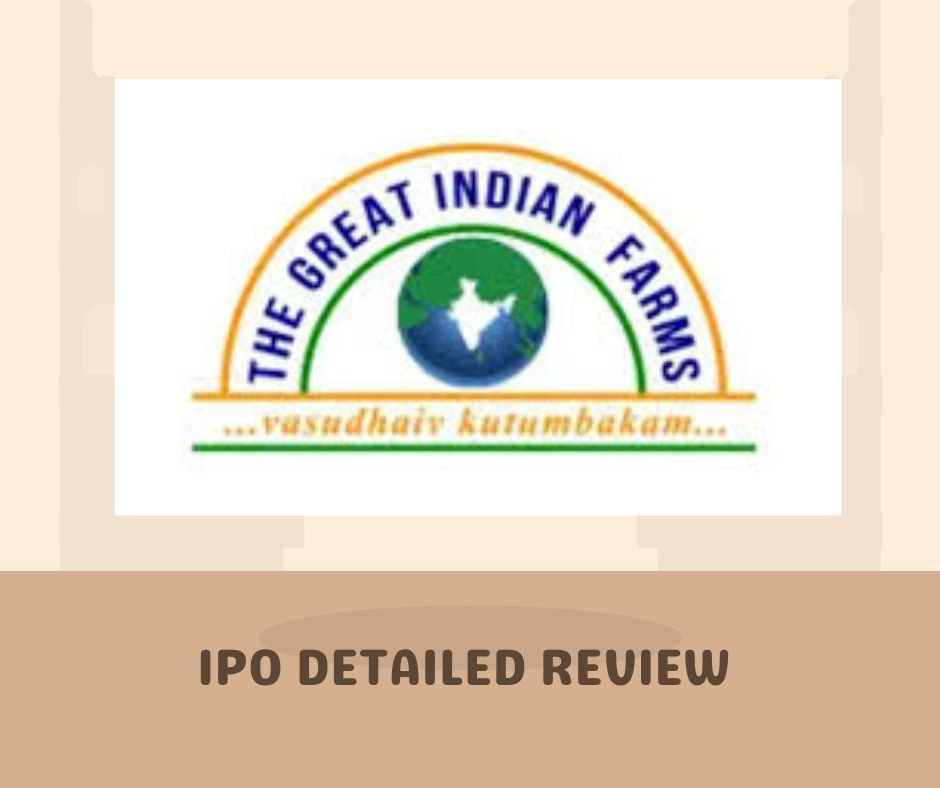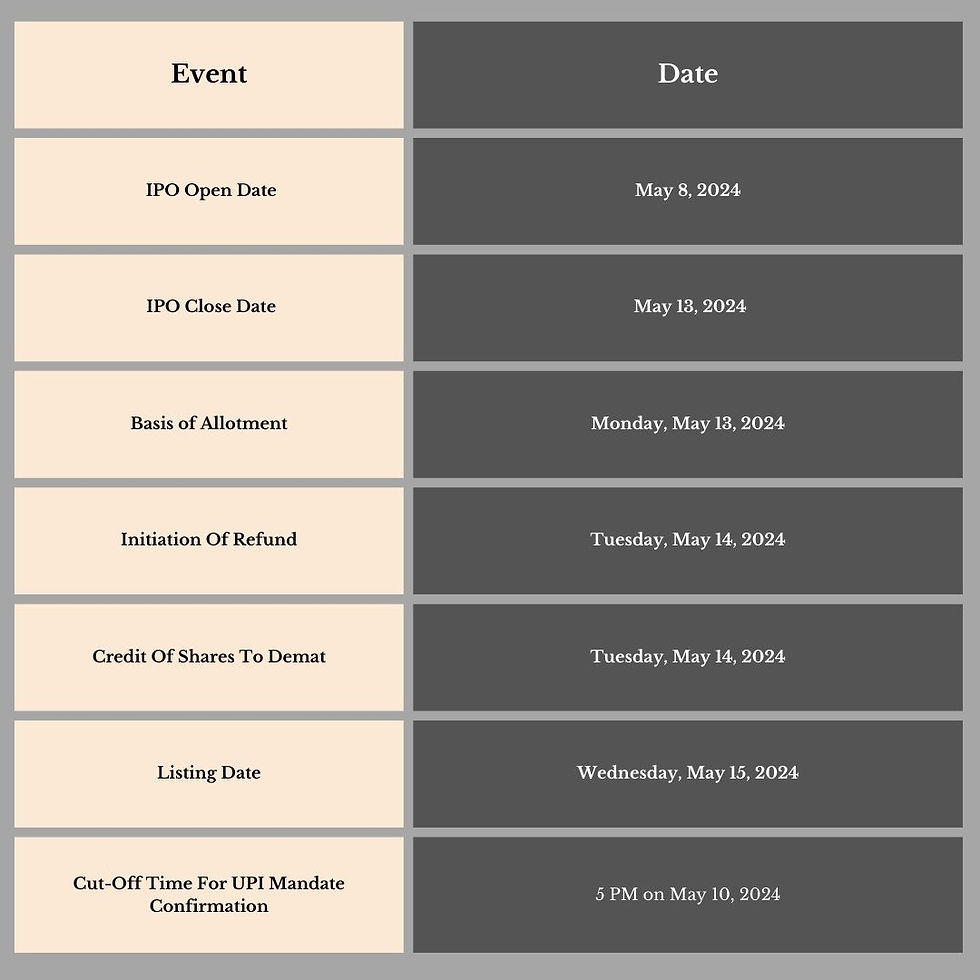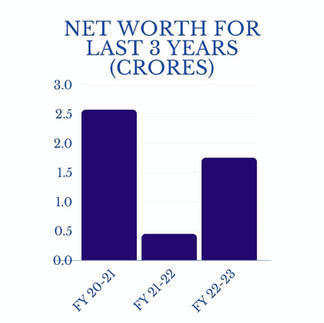TGIF Agribusiness Limited IPO Review
- Vaani Shrivastava
- May 8, 2024
- 11 min read
Updated: May 9, 2024

TGIF Agribusiness Limited IPO Review
TGIF Agribusiness Limited, a name that has become increasingly prominent in the field of horticulture, is a company that has carved out a niche for itself in the open field cultivation of a variety of fruits and vegetables. Founded in 2014, originally as ARV Farmpro LLP, TGIF Agribusiness has been actively engaged in the cultivation of pomegranates, dragon fruit, and timber plantations, specifically sagwan trees.
At the helm of TGIF Agribusiness Limited are Mr. Niraj Chhaganraj Gemawat and Ms. Rachana Niraj Gemawat, who have been instrumental in steering the company towards its current success. Their vision and leadership have seen the company's promoter holding pre-IPO stand at 99.80%, which post-IPO is expected to be diluted to 73.28%.
The company's operations are rooted in the state of Gujarat, with its corporate registration in Ahmedabad. However, its farmland spans over 110 acres and is situated in the vicinity of three villages - Ajari, Kasindra, and Kojra - all located in the tehsil of Pindwara, district Sirohi, Rajasthan. This strategic location has allowed TGIF Agribusiness to leverage the fertile land for its horticultural endeavors.
TGIF Agribusiness was established with a clear objective: to engage in the business of open field cultivation of fruits and vegetables. The company's inception was driven by the desire to contribute to the agriculture sector, which holds significant importance in India, being the second-largest agricultural land in the world and providing employment for about half of the country’s population.
The rationale behind the founding of TGIF Agribusiness was not just to participate in the agriculture sector but to innovate within it. By focusing on specific fruit and vegetable varieties that have both domestic and international demand, the company aimed to create a sustainable and profitable business model that could contribute to the agricultural economy and provide high-quality produce.

Competitive Strengths
TGIF Agribusiness Limited, a prominent player in the horticulture sector, has recently garnered attention with its initial public offering (IPO). The company's competitive strengths lie in its strategic approach to agriculture, focusing on open farming of a variety of fruits and vegetables. With over 110 acres of farmland situated near Ajari, Kasindra, and Kojra villages, TGIF Agribusiness has established a significant presence in the industry.
Revenue, Sales, and Profit
TGIF Agribusiness Limited, an entity engaged in the cultivation of various fruits and vegetables, has shown a positive financial trajectory in recent times. For the financial year ending March 31, 2023, the company reported a revenue increase of 12.14% compared to the previous year. This growth is a testament to the company's expanding operations and market reach. Additionally, the profit after tax (PAT) for the same period rose by 12.63%, indicating not only increased sales but also efficient management and operational effectiveness.
Distribution Network and Geographical Reach
TGIF Agribusiness Limited, established in 2014, has developed a robust distribution network and geographical reach that is integral to its operations. The company primarily engages in the cultivation of a variety of fruits and vegetables, such as pomegranates, dragon fruit, lemons, watermelons, and chilies, on over 110 acres of farmland located in the vicinity of Ajari, Kasindra, and Kojra in Rajasthan. Their distribution network is structured around a B2B business model, catering to retailers, wholesalers, retail chains, hypermarkets, and mandis. Additionally, TGIF Agribusiness Limited is planning to expand its reach by implementing a Direct2home Service, which will enable them to sell products directly to customers, enhancing their B2C capabilities. This strategic move is expected to diversify their distribution channels and increase their market penetration. The company's geographical reach, centered in a region known for its agricultural productivity, combined with its distribution strategy, positions TGIF Agribusiness Limited to effectively meet the demands of a diverse customer base while also planning for future growth and expansion.
Unique Features
TGIF Agribusiness Limited is a horticulture company that has carved a niche for itself in the open farming sector, specializing in the cultivation of a variety of fruits and vegetables. With over 110 acres of farmland located near the villages of Ajari, Kasindra, and Kojra, the company has a significant presence in the agricultural landscape. Their portfolio includes the cultivation of pomegranates, dragon fruit, and timber plantations, particularly sagwan trees, which are known for their valuable wood. Additionally, they grow and harvest seasonal produce such as lemons, watermelons, and chilies. The company's approach to agriculture combines traditional farming techniques with modern equipment and irrigation systems, aiming to enhance productivity and sustainability.
Investment in Research and Development
TGIF Agribusiness Limited, a horticulture company engaged in open farming of fruits and vegetables, has shown a commitment to innovation through its investments in research and development (R&D). The company's recent Initial Public Offering (IPO) aimed to raise funds for various purposes, including the purchase of agricultural equipment and irrigation systems, which are crucial for enhancing R&D capabilities. The proceeds from the IPO will also support the company's working capital requirements and general corporate purposes, which may include further investments in R&D to improve farming practices and crop yields. With the agriculture sector being a significant part of India's economy and TGIF Agribusiness's focus on sustainable farming, such investments in R&D can lead to advancements in agricultural technology and practices that benefit the industry as a whole.

TGIF Agribusiness Limited IPO Details
Issue Date: The Issue Date in an Initial Public Offering (IPO) refers to the specific day when a company's shares are first made available for public purchase on the stock market. This date is a critical milestone in the IPO process, marking the transition of a company from private to public status and allowing investors to buy shares directly from the company for the first time. (Issue Date: May 8, 2024 to May 10, 2024).
Listing Date: The listing date refers to the day when the company's shares are officially listed and begin trading on a stock exchange. This is typically several business days (3-6 days) after the issue date after processes like share allotment and finalization are completed. On this date, investors who were allotted shares during the IPO can begin selling them, and new investors can start purchasing them on the exchange at the prevailing market price. (Listing Date: Wednesday, May 15, 2024).
Face Value of Shares: The face value of shares in an Initial Public Offering (IPO) refers to the original cost of the shares as determined by the company going public. It represents the nominal value and is often set at a lower figure, such as Rs. 10 or Rs. 100, which remains constant irrespective of the market price of the share after the company is listed on the stock exchange. When a company launches an IPO, the shares are typically offered at a price that includes this face value plus an additional premium, which reflects the current market valuation of the company. The premium over the face value is determined by the company's financial performance and future growth prospects as assessed by the investment bankers managing the IPO. (Face Value: ₹10 per share).
Price Band: A price band of an IPO is the range of prices within which the investors can bid for the shares of a company that is going public. The price band is set by the issuer and the lead managers of the IPO, based on various factors such as the demand and supply of the shares, the financial performance and valuation of the company, and the market conditions. (IPO Price: ₹93 per share).
Lot Size: In the context of an Initial Public Offering (IPO), the term "lot size" refers to a fixed number of shares that the issuing company sets as the minimum quantity that investors can apply for. This lot size is predetermined before the IPO and is mentioned in the application forms. The lot size varies from one company to another and is an important factor for investors to consider when applying for an IPO. (Lot Size: 1200 Shares).
Total Issue Size: The total issue size represents the total number of shares the company is offering to raise capital through the IPO. This number is determined by the company and its advisors, considering factors like their funding needs and the expected investor demand. The total issue size is then divided by the lot size to determine the total number of lots available for purchase by investors. (Total Issue Size: 687,600 shares (aggregating up to ₹6.39 Cr) ).
Fresh Issue: A Fresh Issue in the context of an Initial Public Offering (IPO) refers to the creation and sale of new shares by a company to the public. Unlike an Offer for Sale, where existing shareholders sell their shares, a Fresh Issue results in the generation of new capital for the company. This capital is typically used for growth initiatives such as expansion, research and development, or debt repayment. (Fresh Issue: 687,600 shares (aggregating up to ₹6.39 Cr) ).
Issue Type: The type of an IPO can vary depending on the market and regulatory conditions. Some of the common types of IPOs are, Fixed priced IPO, Auction IPO, Book Building IPO, and Hybrid IPO. (Issue Type: Fixed Price Issue IPO).
Listing At: An integral part of the IPO process is the listing. This refers to the day the company's shares officially begin trading on a stock exchange, such as the National Stock Exchange (NSE) or the Bombay Stock Exchange (BSE) in India. Once listed, anyone with a brokerage account can buy and sell the company's shares on the exchange. (Listing at: BSE SME).
Retail Shares Offered: Retail shares offered in an IPO refer to the portion of shares that are specifically allocated for individual investors, as opposed to institutional investors. These shares are part of the public offering where companies going public aim to raise capital by selling shares. Retail investors are typically allocated a certain percentage of the total shares available for the IPO. The allotment process for retail investors is designed to be fair and transparent, ensuring that all investors have an equal chance of receiving shares based on their application and market conditions. (Retail Shares Offered: 326,400 (47.47%)).
Market Makers Shares Offered: Market Maker Shares in an IPO refer to the shares that are allocated to market makers, who are responsible for improving the liquidity and facilitating better price discovery of the stock post-IPO. Market makers are registered members of the stock exchange and provide two-way quotes, buying and selling shares at predetermined prices. This system is particularly important for SME (Small and Medium-sized Enterprises) IPOs, where market makers play a crucial role in ensuring that there is enough trading activity and stability in the stock's price. (Market Maker Shares Offered: 34,800 (5.06%)).
Other Shares Offered: 326,400 (47.47%).
Competitors of TGIF Agribusiness Limited
TGIF Agribusiness Limited operates in the dynamic and ever-evolving sector of agriculture, which is a cornerstone of the Indian economy. The company, known for its horticultural endeavors, faces competition from various other entities that also strive to make a mark in this industry.
One of the notable competitors is Bombay Burmah Trading Corporation Ltd., a company with a rich history dating back to 1863. It has diversified interests, including plantations, where it has made significant strides in tea, coffee, and other agricultural products. With a market capitalization of over 10,000 crores and a sales turnover that reflects its substantial presence, Bombay Burmah is a formidable player in the agribusiness landscape.
Kaveri Seed Company Ltd. is another major competitor, primarily known for its production of hybrid seeds. The company's market cap and sales turnover indicate its strong position in the seed industry, which is crucial for the agricultural sector. Kaveri Seed's extensive research and development efforts have helped it maintain a competitive edge.
Other competitors include Nath Bio-Genes (India) Ltd., which focuses on the production of genetically modified and hybrid seeds, and Harrisons Malayalam Ltd., which has a significant presence in the plantation business, especially in rubber and tea. These companies, along with Shreeoswal Seeds and Chemicals Ltd., Mangalam Global Enterprise Ltd., and Upsurge Seeds of Agriculture Ltd., contribute to a competitive environment that drives innovation and growth in the agricultural sector.
TGIF Agribusiness Limited also contends with Dhunseri Tea & Industries Ltd., known for its tea production, and Nirman Agri Genetics Ltd., which operates in the field of crop genetics and biotechnology. These companies, along with Agri-Tech (India) Ltd., present a diverse range of challenges and opportunities for TGIF Agribusiness Limited in the marketplace.
The competitive landscape is further enriched by the presence of unlisted entities and smaller firms that specialize in niche markets or regional agricultural practices. This diversity ensures that TGIF Agribusiness Limited must continually adapt and innovate to maintain its position in the market.
For investors and stakeholders, understanding the competitive dynamics is crucial. It provides insight into the company's performance, strategic positioning, and potential for growth. As TGIF Agribusiness Limited navigates through these competitive waters, it will be interesting to observe how it leverages its strengths and addresses the challenges posed by its rivals.
Conclusion
In conclusion, the TGIF Agribusiness Limited IPO presents a unique investment opportunity in the horticulture sector. With its focus on open farming of fruits and vegetables, particularly pomegranates, the company has demonstrated surprising net earnings despite its small top lines. However, investors should note that the company operates in a highly competitive and fragmented market. The IPO, based on the FY24 annualized earnings, seems fully priced, suggesting that the potential for short-term gains may be limited. Nevertheless, for well-informed investors with a medium to long-term investment horizon, this IPO could offer moderate rewards as the company explores expansion through its B2C model and capitalizes on increasing consumer demand. It is essential for investors to conduct thorough due diligence and consider their risk appetite before participating in this IPO.
Please Read the Detailed Review Here.
Disclaimer: This is not an investment advisory. The article above is for information purposes only. Investments in the securities market are subject to market risks, read all the related documents carefully before investing. Please consider your specific investment requirements, risk tolerance, goal, time frame, risk and reward balance, and the cost associated with the investment before choosing securities, that suit your needs. The performance and returns of any equity stock can neither be predicted nor guaranteed.
FAQs
Q: What is an IPO?
An Initial Public Offering (IPO) is a process through which a privately held company offers its shares to the public for the first time and becomes a publicly traded company.
Q: How can I apply for an IPO?
You can apply for an IPO through various methods:
ASBA (Application Supported by Blocked Amount): In this method, your application money remains in your bank account until the basis of allotment is finalized.
UPI (Unified Payment Interface): You can authorize the blocking of funds in your bank account using UPI while applying for an IPO.
Q: What is ASBA?
ASBA stands for Application Supported by Blocked Amount. It allows your application money to be blocked in your bank account during the IPO bidding process. You continue to receive interest on the blocked amount.
Q: What is the difference between book building and a normal public issue?
Book building is a process where demand for securities is elicited and the price is assessed based on investor bids. In a normal public issue, the price is fixed by the issuer.
Q: Can I make payments through UPI for IPOs?
Yes, you can use UPI as a payment method for IPOs. The UPI platform blocks the funds for IPO applications after you approve the fund block mandate request.
Q: What is the minimum order quantity for an IPO?
The minimum number of shares you can apply for in an IPO is known as the minimum order quantity. It varies for each IPO.
Q: What is the cut-off price in an IPO?
The cut-off price is the price at which you bid for shares without specifying a particular price. It allows you to participate in the IPO without specifying a specific bid price.
Q: Can I revise my bids during the IPO process?
Yes, you can revise your bids multiple times before the IPO bidding period ends.
Q: Which banks offer the ASBA facility for IPOs?
Several banks, known as Self Certified Syndicate Banks (SCSBs), offer the ASBA facility. Some examples include HDFC Bank, ICICI Bank, Axis Bank, and SBI.
Q: How do I find IPO mandates on UPI apps?
You can check the list of UPI handles supported for IPO payments on the National Payments Corporation of India (NPCI) website. These handles allow you to apply for IPOs using UPI.



































Comments